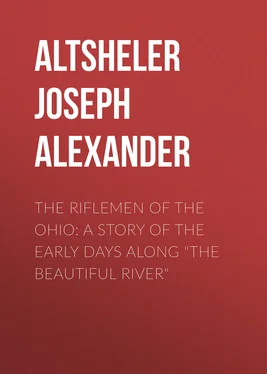Joseph Altsheler - The Riflemen of the Ohio - A Story of the Early Days along The Beautiful River
Здесь есть возможность читать онлайн «Joseph Altsheler - The Riflemen of the Ohio - A Story of the Early Days along The Beautiful River» — ознакомительный отрывок электронной книги совершенно бесплатно, а после прочтения отрывка купить полную версию. В некоторых случаях можно слушать аудио, скачать через торрент в формате fb2 и присутствует краткое содержание. Жанр: foreign_children, foreign_antique, foreign_prose, prose_military, на английском языке. Описание произведения, (предисловие) а так же отзывы посетителей доступны на портале библиотеки ЛибКат.
- Название:The Riflemen of the Ohio: A Story of the Early Days along The Beautiful River
- Автор:
- Жанр:
- Год:неизвестен
- ISBN:нет данных
- Рейтинг книги:5 / 5. Голосов: 1
-
Избранное:Добавить в избранное
- Отзывы:
-
Ваша оценка:
- 100
- 1
- 2
- 3
- 4
- 5
The Riflemen of the Ohio: A Story of the Early Days along The Beautiful River: краткое содержание, описание и аннотация
Предлагаем к чтению аннотацию, описание, краткое содержание или предисловие (зависит от того, что написал сам автор книги «The Riflemen of the Ohio: A Story of the Early Days along The Beautiful River»). Если вы не нашли необходимую информацию о книге — напишите в комментариях, мы постараемся отыскать её.
The Riflemen of the Ohio: A Story of the Early Days along The Beautiful River — читать онлайн ознакомительный отрывок
Ниже представлен текст книги, разбитый по страницам. Система сохранения места последней прочитанной страницы, позволяет с удобством читать онлайн бесплатно книгу «The Riflemen of the Ohio: A Story of the Early Days along The Beautiful River», без необходимости каждый раз заново искать на чём Вы остановились. Поставьте закладку, и сможете в любой момент перейти на страницу, на которой закончили чтение.
Интервал:
Закладка:
"Why do you talk to me about Timmendiquas?" asked Henry. "I've seen him, I've been with him for days, I know what he is."
"I'm coming to it. Timmendiquas likes you. He thinks you're fitted for the forest and a life like the one he leads. Other Wyandots who have observed you agree with him, and to tell you the truth I think so, too, myself."
"Well!" said Henry. He now divined what Girty was going to reveal, but he wished the renegade to tell it himself.
"Timmendiquas will be in the council house several days longer, purifying himself, but when he does come out, they'll say to you: 'Be a Wyandot or die.' They'll put it to you plain, just as it has been put to white men before you."
Henry stirred a little. Certainly he did not wish to die, nor did he expect to die, but he would risk the alternative.
"Girty," he said, slowly, "an offer something like this was made to me once before. It was made by a Spaniard far down in the south. You never knew him—he's dead now—but your friend, Braxton Wyatt did—but the other thing wasn't death, nor did he ask me, if I took his offer, to make war upon the settlements in Kentucky. Before I'd turn Indian like you and Braxton Wyatt and the others, and murder my own people, you infamous renegade, I'd be torn to pieces or burned at the stake a dozen times over!"
The words were hurled out by passion and feeling as the flash of powder sends forth the bullet. The renegade shrank back, and rose to his feet, his eyes aflame, but in a moment or two he sank down again, laughing a little.
"That's what I knew you'd say," he said, "and I came here to hear you say it. I wanted to force the hand of Timmendiquas, and I've done it. I don't want you to join us, and I'll tell you why. I intend to be first here, first among the white leaders of the Indians, but if you were to come with us you'd be first yourself in three or four years, and I'd be only second. See how much I think of your powers."
"I don't thank you for your compliment," said Henry boldly, "but I'll thank you if you'll get out of this lodge. I think you're the worst man I've ever seen."
Simon Girty frowned again, and raised his hand as if to strike the bound youth, but refrained.
"We don't see things alike," he said, and abruptly left the lodge.
Henry felt his evil presence long after he had gone, as if some foul animal had entered the lodge, and presently, when old Heno came, he asked him as a great favor to leave the door open for a while. When the cool, fresh air rushed in he breathed it in great draughts and felt relieved. He admired Timmendiquas. He respected the Wyandots. He could not blame the Indian who fought for his hunting grounds, but, with all the strength of his strong nature, he despised and hated every renegade.
That evening, after old Heno had gone, he sought for the first time to slip or break his bonds. He wanted to get away. He wanted to rejoin his comrades and the fleet. He wanted to help them prepare for the new dangers. But strain as he might with all his great strength, and twist as he would with all his ingenuity, he could not get free. He gave it up after a while and lay on his rush mat in a state of deep depression. It seemed that the Wyandots, cunning and agile, flower of the red men, would give him no chance.
He had asked Heno to leave the door of the lodge partly open a while longer that he might have plenty of fresh air, and the old warrior had done so. He heard faint noises from the village, but bye and bye they ceased, and Henry at last fell asleep.
Deep in the night he heard a musical sound, a small note but clear and sweet. It reached him easily, although it seemed to come from the forest four or five hundred yards away, and it spoke in almost audible tones, telling him to be of good faith, that what he wished would come to pass. It was the wind among the leaves again, something mystical but almost human to him. It was the third time that it had sung to him, once in warning, twice in hope, and the depression that he had felt when he laid down vanished utterly. A deep sense of peace and content pervaded his whole being. It was a peace of the senses and mind alike, driving away all trouble either for the present or the future.
He was called to deeper rest. The voice of the forest still sang to him, becoming softer and softer and fainter and fainter, and the feeling of absolute content was overwhelming. He did not seek to move, but permitted himself, as if under an opiate, to drift away into a far slumberland, while the note from the forest sank to nothing.
When he awoke the next morning he did not know whether he had really heard or had merely dreamed.
CHAPTER V
PLAY AND COUNCIL
Henry was still a prisoner in the lodge when the purification of Timmendiquas was finished. He had been permitted to go forth now and then under a strong guard, but, no matter how closely he watched, not the slightest chance of escape presented itself. He saw the renegades about, Braxton Wyatt among them, but none of these men spoke to him. It was evident to him, however, from the respectful manner in which the Wyandots treated Girty that he had great influence among them.
The warriors seemed to be in no hurry about anything. The hunters were bringing in plenty of game, and the village life went forward merrily. But Henry judged that they were merely waiting. It was inconceivable that the Wyandots should remain there long in peace while the Indian world of all that great valley was seething with movement.
Timmendiquas came to see him at the end of the sixth day of purification, and treated him with the courtesy due from a great chief to a distinguished prisoner.
"Have our warriors been kind to you?" he asked.
"They have done everything except let me slip away," replied Henry.
Timmendiquas smiled.
"That is the one thing that we do not wish," he said. "They think as I do that you are fit to be a Wyandot. Come, I will loose your hands, and together we will see our young men and young women play ball."
Henry was not at all averse. Both his nature and his long but friendly captivity in a far northwestern tribe made him have a keen sympathy with many traits in the Indian character. He could understand and like their sports.
"I'll go gladly, White Lightning," he said. "I don't think you need ask me to give any promise not to escape. I won't find any such chance."
The chief smiled with pleasure at the compliment, undid the bonds, and the two walked out into the brilliant sunshine. Henry felt at once that the village was tingling with excitement. All were hurrying toward a wide grassy meadow just at the outskirts of the village, and the majority of them, especially the young of either sex, laughed and chattered volubly. There was no restraint. Here among themselves the Indian repression was thrown aside.
Henry, with the shadow of great suffering and death over him, felt their thrill and excitement. The day was uncommonly fine, and the setting of the forest scene was perfect. There was the village, trim and neat in its barbaric way, which in the sunshine was not an unpleasant way, with the rich meadows about it, and beyond the great wilderness of heavy, circling dark green.
All were now gathered at the edge of the meadow, still laughing, chattering, and full of delight. Even the great Timmendiquas, red knight, champion and far-famed hero at twenty-five, unbent and speculated with keen interest on the result of the ball game, now about to be played. Henry felt his own interest increasing, and he rubbed shoulders with his old friends, Heno the Thunder, Anue the Bear, and Hainteroh the Raccoon. The gallant Raccoon still carried his arm in a sling, but he was such a healthy man that it would be well in an incredibly brief period, and meantime it did not interfere at all with his enjoyment of a ball game.
Читать дальшеИнтервал:
Закладка:
Похожие книги на «The Riflemen of the Ohio: A Story of the Early Days along The Beautiful River»
Представляем Вашему вниманию похожие книги на «The Riflemen of the Ohio: A Story of the Early Days along The Beautiful River» списком для выбора. Мы отобрали схожую по названию и смыслу литературу в надежде предоставить читателям больше вариантов отыскать новые, интересные, ещё непрочитанные произведения.
Обсуждение, отзывы о книге «The Riflemen of the Ohio: A Story of the Early Days along The Beautiful River» и просто собственные мнения читателей. Оставьте ваши комментарии, напишите, что Вы думаете о произведении, его смысле или главных героях. Укажите что конкретно понравилось, а что нет, и почему Вы так считаете.












